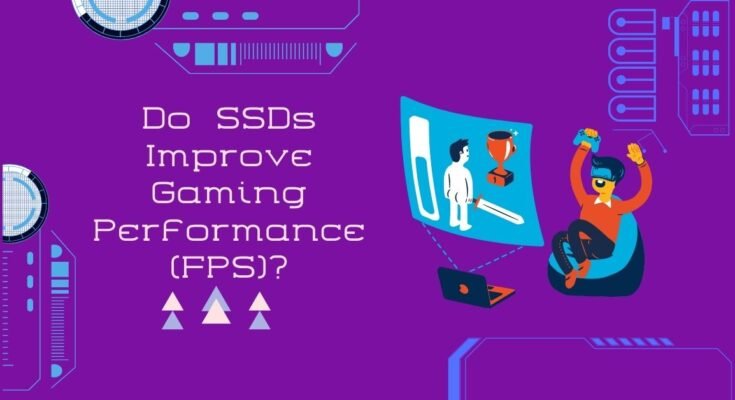“SSD” stands for “Solid State Drive”. This is a hard disk drive that uses solid-state memory such as NAND, instead of normal mechanical disks.
A modern gaming computer has about six or more different types of storage devices: physical disk drives (HDDs and SSDs), RAM, CPU cache, motherboard chipset cache (Northbridge), graphics card RAM (VRAM), and network storage.
A traditional mechanical hard disk drive has moving parts that create noise and vibrations; to read the data on the disk, the HDD head must seek it (and often be blocked by it) physically, because random access memory does not need to move.
A modern SSD does not have these problems, and so the operating system can pick the data it wants faster than an HDD.
So, the real question is does SSD improve Gaming Performance? Lets find out!
What SSDs do best: loading data
An SSD loads data faster than an HDD, let’s say 200 milliseconds (ms) for an SSD and 500 ms for an HDD. The difference is 300 ms or 33%, which may not seem like much, but it adds up when you are loading many files over time.
The operating system can load things faster too, because it is faster to seek on an SSD than it is to move the disk head of an HDD. Theoretically, this is still 33% faster: 200 ms for an SSD and 300 ms for an HDD (again, operating system overhead affects the time as well).
When its comes to gaming, a lot of data transfer takes place as a result SSD has an edge over HDD. Loading times improve. Also in certain open world games that hit the drive hard constantly, you can prevent some micro stutter sometimes with an SSD.
What about in-game performance, like FPS?
There is a common perception that an SSD improves FPS. In fact it’s the opposite, especially if you have a modern mid to high end graphics card.
High end GPUs use fast GDDR5 memory which run at clock speeds up to 5500 MHz nowadays. Because of this, CPUs and GPUs race each other for data bandwidth for framebuffer reads and writes, because both need it.
Because even a SATA3 SSD cannot provide enough read/write throughput to feed the GPU its data, they are bottlenecked by the hard drive bus in most cases! A GTX 980 with DDR5 runs out of memory bandwidth long before it ever hits its limits on reading or writing across the SATA bus (about 300-400 GB/sec).
So no, SSDs will not improve your in-game FPS (at best you’ll be limited by the GPU).
What about loading times then?
Loading times are reduced by an SSD because it can read/write data faster than HDD. You are no longer bottlenecked by the drive bus, so stop thinking about your graphics card being the bottleneck. And now that games are larger than ever, you might want to take note of how long it takes to load them…
So now you know. For gaming purposes, an SSD is more useful for extending battery life on laptops or loading screens, etc., but not for improving frame rate or playability in any way shape or form. If anything getting a fast 10K RPM HDD would have more of a positive impact on gaming performance than getting any SSD.
An M2 or mSATA SSD will have a slightly less negative effect, but you don’t want to go crazy with those either as they are harder to maintain and not as widely supported as SATA3.
And yes! The difference can be felt by the player because of all the “stuttering”, though it’s not actually stuttering if your FPS is keeping up it’s just object loading which causes an illusion of low FPS.
Don’t forget that gamers have been conditioned for years to think first about graphics card speeds so gamers would first thing an improvement in framerate instead of a slight decrease in texture quality and polygon count.
But increasing video memory decreases drawing speed if that increase does not match or exceed the increase in texture quality and polygon count so there’s a balance between detail and speed.



